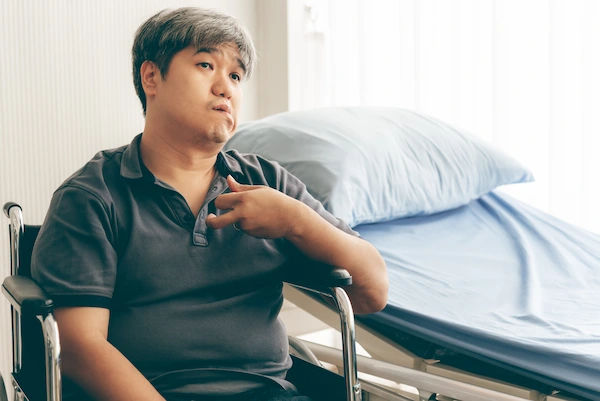Understanding Paralysis: Causes, Types, and Key Signs
Know about paralysis, types, causes, types, key signs and treatment options for paralysis and more.

Written by Dr. Dhankecha Mayank Dineshbhai
Reviewed by Dr. Rohinipriyanka Pondugula MBBS
Last updated on 13th Jan, 2026

Introduction
Paralysis is a life-altering condition that millions of people live with worldwide. It's characterised by the loss of muscle function in part of your body, occurring when something goes wrong with the way messages pass between your brain and your muscles. This loss of movement and sensation can be temporary or permanent, partial or complete, and localised or generalised. This article will demystify the complex medical landscape of paralysis, breaking down the various types of paralysis, their root causes from stroke and spinal cord injury to neurological diseases, and the critical signs to watch for.
What Exactly is Paralysis? A Breakdown of the Nervous System
At its core, paralysis is not a disease itself but a symptom of a wide range of conditions that affect the nervous system. Your brain generates a signal to move a muscle. That signal travels down your spinal cord, a superhighway of nerve fibres protected by your vertebrae. Paralysis occurs when a link in this chain, the brain, spinal cord, or nerves, is damaged or disrupted. This neurological damage means the signal never reaches its destination, leaving the muscle unable to contract. It's important to note that the muscle itself is often still healthy; the problem lies in the wiring that controls it.
Consult a Neurologist for Personalised Advice
The Primary Causes: What Leads to Paralysis?
A multitude of conditions can lead to paralysis. They are typically categorised by where they affect the nervous system.
1. Stroke: A Leading Cause
- A stroke occurs when the blood supply to part of the brain is cut off, either by a clot (ischemic stroke) or a burst blood vessel. Without oxygen-rich blood, brain cells begin to die within minutes. If the affected area of the brain controls motor function, it can result in paralysis on one side of the body (hemiplegia).
2. Spinal Cord Injury (SCI)
Damage to the spinal cord is one of the most direct causes of paralysis. The spinal cord does not regenerate well, making these injuries often permanent.
Traumatic SCI can result from:
- Car accidents
- Falls
- Violent acts (e.g., gunshot wounds)
- Sports injuries
Non-traumatic SCI can be caused by:
- Spinal cord tumours
- Spinal stenosis (narrowing of the spinal canal)
- Infections or inflammation
- Genetic conditions like Spina Bifida
The level of the injury (e.g., cervical, thoracic, lumbar) directly determines which parts of the body are paralysed.
3. Neurological Diseases
Several progressive diseases attack the nervous system, leading to paralysis.
- Multiple Sclerosis (MS): An autoimmune disease where the body's immune system attacks the protective sheath (myelin) around nerves, disrupting communication.
- Amyotrophic Lateral Sclerosis (ALS/Lou Gehrig's Disease): A progressive disease that destroys the nerve cells controlling voluntary muscles.
- Guillain-Barré Syndrome: A rare disorder where the immune system attacks the peripheral nerves, often starting with weakness and tingling in the legs that can rapidly escalate to paralysis.
4. Other Significant Causes
- Cerebral Palsy: A group of disorders affecting movement and muscle tone, caused by damage to the developing brain, often before birth.
- Bell's Palsy: A temporary paralysis or weakness of the muscles on one side of the face, believed to be caused by viral inflammation of the facial nerve.
- Neurofibromatosis: A genetic disorder that causes tumours to form on nerve tissue.
Classifying the Different Types of Paralysis
Paralysis is not a one-size-fits-all condition. It is classified in several ways, which helps doctors diagnose the cause and plan treatment.
By Severity: Paresis vs. Plegia
- Paresis: Refers to partial or mild weakness in a muscle or group of muscles. A person with paresis can still move the affected limb, but with significantly reduced strength.
- Plegia (or -plegia): Refers to the complete loss of muscle function for a particular muscle or muscle group. This is what most people think of as total paralysis.
By Muscle Tone: Flaccid vs. Spastic
- Flaccid Paralysis: The muscles become limp, shrink (atrophy), and cannot contract. This is caused by damage to the lower motor neurons (nerves connecting the spinal cord to muscles).
- Spastic Paralysis: The muscles are tight, stiff, and prone to involuntary spasms. This is caused by damage to the upper motor neurons (nerves within the brain and spinal cord that initiate movement).
By Location and Extent: Where is the Paralysis?
This is the most common way to describe paralysis.
- Monoplegia: Paralysis affects only one limb, usually an arm or leg. It is commonly caused by cerebral palsy or stroke.
- Hemiplegia: Paralysis affects one entire side of the body (arm and leg). This is most often associated with a stroke or brain injury.
- Paraplegia: Paralysis affects both legs and sometimes part of the trunk. It results from injuries to the thoracic or lumbar spinal cord.
- Quadriplegia (Tetraplegia): Paralysis affects all four limbs and typically the trunk. It is caused by injury to the cervical spinal cord (neck region).
- Localised Paralysis: Affects a specific, small area, like the face (Bell's Palsy) or vocal cords.
Recognising the Signs and Symptoms of Paralysis
The most obvious sign of paralysis is the inability to move a part of the body. However, the onset can be sudden (like from a stroke or injury) or gradual (like from MS). Key signs include:
- Loss of movement or muscle control in a body part.
- Numbness or a complete loss of sensation (anaesthesia).
- Tingling or "pins and needles" sensations (paresthesia), often an early warning sign.
- Muscle stiffness and involuntary spasms (in spastic paralysis).
- Muscle atrophy (visible shrinking of the muscle).
- Loss of bladder or bowel control due to nerve damage affecting those functions.
If you or someone else experiences sudden paralysis, numbness, or weakness—especially on one side of the body—along with confusion, trouble speaking, or a severe headache, seek emergency medical attention immediately, as these are signs of a stroke.
Diagnosis, Treatment, and Living with Paralysis
Diagnosing the cause of paralysis involves a thorough neurological exam, imaging tests like MRI or CT scans to view the brain and spinal cord, and tests like electromyography (EMG) to measure nerve function. Treatment is not about "curing" paralysis but managing its underlying cause, preventing complications, and maximising independence through rehabilitation therapy.
This includes physical therapy, occupational therapy, speech therapy, and the use of assistive devices like wheelchairs, braces, and advanced technologies. Psychological support is also a critical component of care, helping individuals and families adapt to a new way of life.
Conclusion
Paralysis is a complex condition with a vast array of causes, from sudden traumatic events like spinal cord injuries and strokes to progressive neurological diseases like MS and ALS. While the loss of muscle function is the defining characteristic, the journey involves managing a wide range of physical and emotional challenges. If you take away one thing, let it be the importance of recognising the early warning signs, particularly of a stroke, as immediate action can save lives and limit long-term damage.
Consult a Neurologist for Personalised Advice
Consult a Neurologist for Personalised Advice

Dr. Aditendraditya Singh Bhati
Neurosurgeon
21 Years • MBBS(2004), DNB Neurosurgery(2014); MNAMS; Fellow Skull Base Endoscopy (Italy), Fellow Extended Skull Base ( Weill Cornell, USA), Fellow ZAP-X Radiosurgery. Member of American Association of Neurological Surgeons
Delhi
Apollo Hospitals Indraprastha, Delhi
(100+ Patients)

Dr. Ganeshgouda Majigoudra
Neurologist
10 Years • MBBS, MD ( GENERAL MEDICINE) DM (NEUROLOGY)
Bengaluru
Apollo Clinic, JP nagar, Bengaluru

Dr. E Prabhakar Sastry
General Physician/ Internal Medicine Specialist
40 Years • MD(Internal Medicine)
Manikonda Jagir
Apollo Clinic, Manikonda, Manikonda Jagir
(150+ Patients)

Dr Debnath Dwaipayan
Neurosurgeon
9 Years • MBBS, MS(Gen. Surgery), DrNB (Neurosurgery)
Delhi
Apollo Hospitals Indraprastha, Delhi

Dr. Uddalak Chakraborty
Neurologist
8 Years • MBBS, MD(GENL.MED.),DM(NEUROLOGY)
Kolkata
MCR SUPER SPECIALITY POLY CLINIC & PATHOLOGY, Kolkata
Consult a Neurologist for Personalised Advice

Dr. Aditendraditya Singh Bhati
Neurosurgeon
21 Years • MBBS(2004), DNB Neurosurgery(2014); MNAMS; Fellow Skull Base Endoscopy (Italy), Fellow Extended Skull Base ( Weill Cornell, USA), Fellow ZAP-X Radiosurgery. Member of American Association of Neurological Surgeons
Delhi
Apollo Hospitals Indraprastha, Delhi
(100+ Patients)

Dr. Ganeshgouda Majigoudra
Neurologist
10 Years • MBBS, MD ( GENERAL MEDICINE) DM (NEUROLOGY)
Bengaluru
Apollo Clinic, JP nagar, Bengaluru

Dr. E Prabhakar Sastry
General Physician/ Internal Medicine Specialist
40 Years • MD(Internal Medicine)
Manikonda Jagir
Apollo Clinic, Manikonda, Manikonda Jagir
(150+ Patients)

Dr Debnath Dwaipayan
Neurosurgeon
9 Years • MBBS, MS(Gen. Surgery), DrNB (Neurosurgery)
Delhi
Apollo Hospitals Indraprastha, Delhi

Dr. Uddalak Chakraborty
Neurologist
8 Years • MBBS, MD(GENL.MED.),DM(NEUROLOGY)
Kolkata
MCR SUPER SPECIALITY POLY CLINIC & PATHOLOGY, Kolkata


